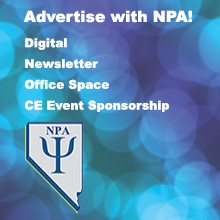|
Navigating Social Media Relationships: Parasocial to Self-Image and Everything in Between
Presented by Erika Dawkins, Psy.D., M.Ed.
Friday, September 19th, 2025 9:00am - 12:15pm PT
3 CE Credits
This workshop will be presented as a live, virtual presentation via Zoom webinar.
Participants will be able to communicate with the presenter in real-time during the course of instruction. As participants can interact in real-time with the presenter, this webinar meets the requirements as a live or face-to-face CE training by the State of Nevada Board of Psychological Examiners (not considered homestudy learning credits).
 Approved for Nevada Psychologists, LCSWs and MFTs. Approved for Nevada Psychologists, LCSWs and MFTs.
NPA is approved by the American Psychological Association to sponsor continuing education for psychologists.
NPA maintains responsibility for this program and its content.
Co-Sponsored by:

About the Workshop:
This workshop will cover the impact that social media has in various areas of our lived experience, including the way that we relate to the worlds around us, one another, and ourselves. We will explore social media application on mediums that allow for commenting, interacting, and resharing such as TikTok, Instagram, Twitter, and YouTube. The focus would be to help psychologist help clients understand how these interactions with social media impact the way that they interact with themselves and others. An additional focus would be to help psychologists have a better sense of how they might desire to show up professionally on these platforms, understanding the both desired and undesired impact of potential clients viewing them in the social media space. This will help psychologists be intentional about their internet and social media presence.
Learning Objectives:
At the end of this presentation, attendees will be able to:
- Explore social media platforms, including TikTok, Instagram, Twitter, and YouTube for evidence of relational dynamics.
- Identify patterns of joy, anxiety, envy, or loneliness that arise from consuming or participating in online content.
- Discuss techniques to mitigate social media-induced stress, screen time management, and fostering meaningful connections online.
- Explore how authenticity impacts online presence through analysis of diverse provider profiles.
- Design content creation strategies aligned with their expertise and values.
- Utilize tools for monitoring online reputation, handling negative reviews, and responding to client inquiries to clean or create current social media presence.
Audience:
This presentation is intended for psychologists, other licensed mental health providers, and graduate students of psychology. Level of learning is Intermediate.
About the Speaker:
 Erika M. Dawkins, Psy.D., M.Ed. is currently a tenure track Assistant Professor at Widener University and the Clinical Director for Chester Community Coalition both in Chester, PA. In 2014, she completed her Doctorate of Psychology (PsyD) in Clinical Psychology and Masters of Education (MEd) in Human Sexuality at Widener University, as part of one of their dual degree programs. Also while at Widener, Dr. Dawkins completed the necessary training in school psychology, and is a certified school psychologist in the state of Pennsylvania. She received her Bachelor’s of Science in Psychology from Howard University in 2008, graduating magna cum laude. Erika M. Dawkins, Psy.D., M.Ed. is currently a tenure track Assistant Professor at Widener University and the Clinical Director for Chester Community Coalition both in Chester, PA. In 2014, she completed her Doctorate of Psychology (PsyD) in Clinical Psychology and Masters of Education (MEd) in Human Sexuality at Widener University, as part of one of their dual degree programs. Also while at Widener, Dr. Dawkins completed the necessary training in school psychology, and is a certified school psychologist in the state of Pennsylvania. She received her Bachelor’s of Science in Psychology from Howard University in 2008, graduating magna cum laude.
Dr. Dawkins’ clinical and research interests include minority identity development, microaggressions, intersectionality, grief, trauma, couples therapy, sexuality, and more recently, the impact that social media has on self image and the development and maintenance of intra- and interpersonal relationships. In supporting young minorities around having positive, healthy relationships, Dr. Dawkins has had the opportunity to speak with many groups arounds the various challenges they may face, and how to navigate them. She has a passion for working with brown women and couples who are seeking to develop and maintain strong, healthy intrapersonal and interpersonal relationships. Often using her own life story to motivate and encourage those she encounters; her belief is that transparency and communication are the keys to making the connections we desire. In 2019, Dr. Dawkins opened her boutique therapy, consulting and coaching firm, Revolutionary Perspectives, LLC. Her life philosophy and objective as the owner of Revolutionary Perspectives, LLC is to “Encourage radical change. Inspire far-reaching impact.”
Dr. Dawkins enjoys decorative planning/journaling, attending live music events, lifting weights, and traveling. Dr. Dawkins credits her success thus far to her run full speed ahead attitude, knowing that even if she trips, she can always get back up and get back at it.
Registration Fees:
NPA members: $75.00 (Early bird discount is $60.00 until 08/09/25)
Non-members: $105.00 (Early bird discount is $85.00 until 08/09/25)
Student members: $30.00 (Registration fees waived for active student members with code)
Student non-members: $60.00
References:
Allcott, H., Braghieri, L., Eichmeyer, S., & Gentzkow, M. The welfare effects of social media. American Economic Review, 2020; 110(3), 629-76.
Christiansen, A., Craythorne, S., Crawford, P., Larkin, M., Gohil, A., Strutt, S., & Page, R. (2025). Multimodal Analysis of Stories Told by Mental Health Influencers on TikTok. Health Expectations, 28(3), 1–12. https://doi.org/10.1111/hex.70226
Gonzalez A. L., Hancock J. T. (2011). Mirror, mirror on my Facebook wall: Effects of exposure to Facebook on self-esteem. Cyberpsychology, Behavior, and Social Networking, 14, 79–83.
Michikyan, M., Dennis, J., & Subrahmanyam, K. (2015). Can You Guess Who I Am? Real, Ideal, and False Self-Presentation on Facebook Among Emerging Adults. Emerging Adulthood, 3(1), 55-64. https://doi.org/10.1177/2167696814532442
Salimkhan G., Manago A., Greenfield P. (2010). The construction of the virtual self on Myspace. Cyberpsychology: Journal of Psychosocial Research on Cyberspace, 1–18.
Subrahmanyam K., Reich S., Waechter N., Espinoza G. (2008). Online and offline social networks: Use of social networking sites by emerging adults. Journal of Applied Developmental Psychology, 29, 420–433.
Tufekci Z. (2008). Can you see me now? Audience and disclosure regulation in online social network sites. Bulletin of Science, Technology & Society, 28, 20–36.
White, E., & Hanley, T. (2025). “I think that we can effect change”: Psychologist use of social media for social justice advocacy. Psychology and Psychotherapy. https://doi.org/10.1111/papt.12601
Yalda T. Uhls, Nicole B. Ellison, Kaveri Subrahmanyam; Benefits and Costs of Social Media in Adolescence. Pediatrics November 2017; 140 (Supplement_2): S67–S70. 10.1542/peds.2016-1758E
Zhao S., Grasmuck S., Martin J. (2008). Identity construction on Facebook: Digital empowerment in anchored relationships. Computers in Human Behavior, 24, 1816–1836.
General Information:
Zoom Login Link and Handout Materials: Zoom webinar login link and Handout materials will be sent out electronically to all attendees no later than one week prior to workshop date. Printed handout materials are not available for purchase as this CE training is being offered remotely.
Workshop Location: Live, virtual webinar via Zoom.
Closed Captions: Live audio captions will be provided for this event. If you need additional disability-related accommodations, please contact us by email us at [email protected] or by phone (888) 654-0050. Requests should be made at least two weeks in advance of workshop date.
Refunds & Grievance Policy: Participants may direct questions or grievances to NPA at (888) 654-0050. An administrative fee of $30 will be charged for cancellation of registration. Please note, no refunds will be granted less than 10 days prior to workshop date 9/9/2025.
Approval: Approved by Nevada Board of Psychological Examiners. Nevada Psychological Association (NPA) is approved by the American Psychological Association to offer continuing education for psychologists. NPA maintains responsibility for the program and its content. NPA will issue certificates of completion. APA CE rules require that we only issue credits to those who attend the entire workshop. Those logging into the Zoom webinar more than 15 minutes late or logging off before the entire workshop is completed will not receive CE credits (i.e. partial CE credit will not be issued).
There is no potential conflict of interest and/or commercial support for this program or its presenter.
|



 Erika M. Dawkins, Psy.D., M.Ed.
Erika M. Dawkins, Psy.D., M.Ed.



